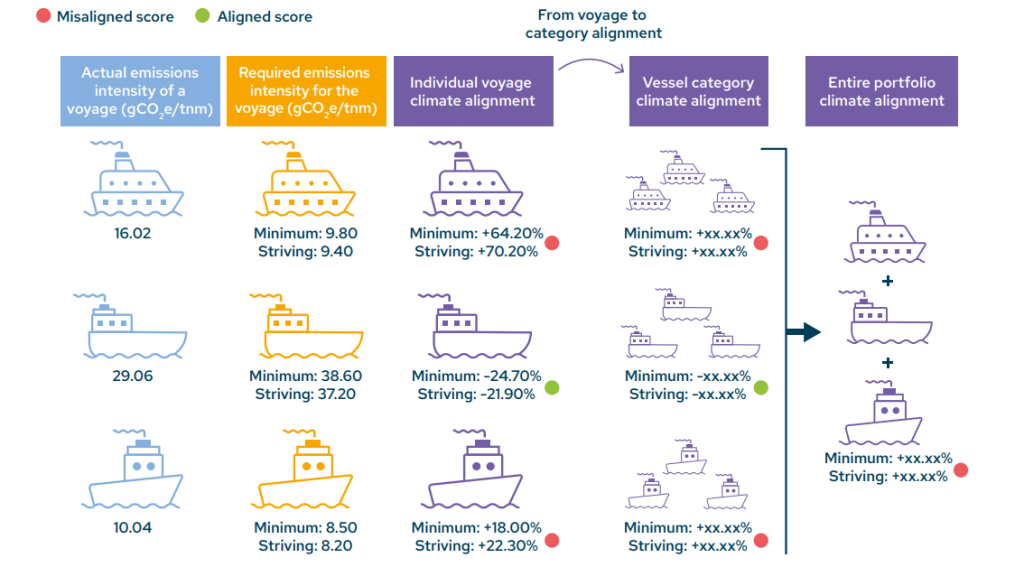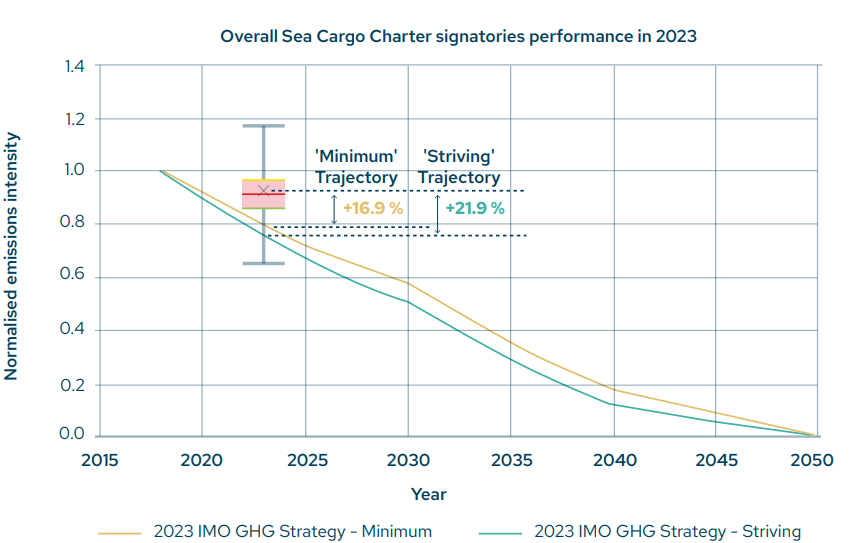The shipping industry must take urgent action to meet ambitious new climate targets set by the International Maritime Organization (IMO), according to a new report from the Sea Cargo Charter (SCC).
New data from the SCC, a global framework representing 20% of global bulk cargo transport, reveals the sector fell short of minimum international climate goals set by the IMO by an average of 17% in 2023, equivalent to 165 million metric tonnes of CO2e. When considering ‘striving’ goals set by the IMO, signatories are on average 22% misaligned, which represents a shortfall of 204 million metric tonnes of CO2e in 2023.

Currently, dry bulk, general cargo, and tankers account for around 400 million tonnes of CO2 emissions. With global trade predicted to quadruple by 2050, emissions will skyrocket without urgent action.
For the first time, this year the SCC signatories have chosen to voluntarily report against much stricter criteria, including the IMO’s revised GHG Strategy, introduced in July 2023. Reporting has also been expanded to include “well-to-wake” emissions, which measure emissions from the extraction of oil to its end use, providing a more comprehensive picture of environmental impact and pushing the industry towards faster decarbonisation.
Key findings
- The scores reveal significant variance: for the IMO’s ‘minimum’ ambition, the average score shows 16.9% misalignment, ranging from -16.5% to 47.6%. Conversely, for the ‘striving’ ambition, the average score indicates 21.9% above target, with scores ranging from -14.8% to 54.7%.
- Various factors influence these scores, including challenges like adapting to longer journey times due to geopolitical disruptions, adjusting operational parameters in ports, and making commercial choices such as energy-saving retrofit programs. Operational specifics such as instructed speed, laden/ballast ratio, and deadweight tonnage utilization on laden voyages also contribute significantly.
- Despite these challenges, signatories remain optimistic and committed to the evolving SCC framework. This framework not only allows them to measure performance against industry standards but also fosters collaboration within a progressive group aiming to meet ambitious decarbonisation goals.
- The growing number of signatories and the high reporting percentage (93.2% on average) of eligible activities covered in reports signify a serious industry-wide commitment to transparency in managing emissions. This trend reflects a collective effort to address climate challenges proactively.
- The shipping industry is actively seeking solutions to climate challenges, emphasizing increased transparency and collaboration between charterers and shipowners. These efforts align with the IMO’s revised strategy, marking positive strides toward sustainability goals.
- Despite the industry’s progress, achieving sustainability remains a complex task. Continued transparency, commitment to innovation, and alignment with evolving standards are essential for navigating towards a more sustainable future.
Despite the misalignment with the IMO’s revised emissions targets, the report also reveals promising trends. The number of SCC signatories has grown to 37 in 2024, 35 of which are reporting this year – a significant increase from 2022, demonstrating a growing commitment to sustainability and transparency within the industry.
Furthermore, the average reporting percentage has shown a steady increase over the past three years, from 80% in 2022 to 93.2%. This year’s report shows that industry collaboration and data sharing is improving. From next year, shipowners – not just charterers – will for the first time also be fully able to form part of the annual report.
“As the Charter continues to attract new members and shape market practices, it underscores the importance of integrating climate considerations into business decisions. These efforts not only enhance emissions transparency but also propel the maritime industry towards a more sustainable future, at a time when action is needed more urgently than ever before.”
… said Sea Cargo Charter chair Rasmus Bach Nielsen and global head of fuel decarbonisation at Trafigura

The 2024 Annual Disclosure Report was produced by the Global Maritime Forum, which performs secretariat services for the Sea Cargo Charter with expert support provided by UMAS and the Smart Freight Centre.






























































